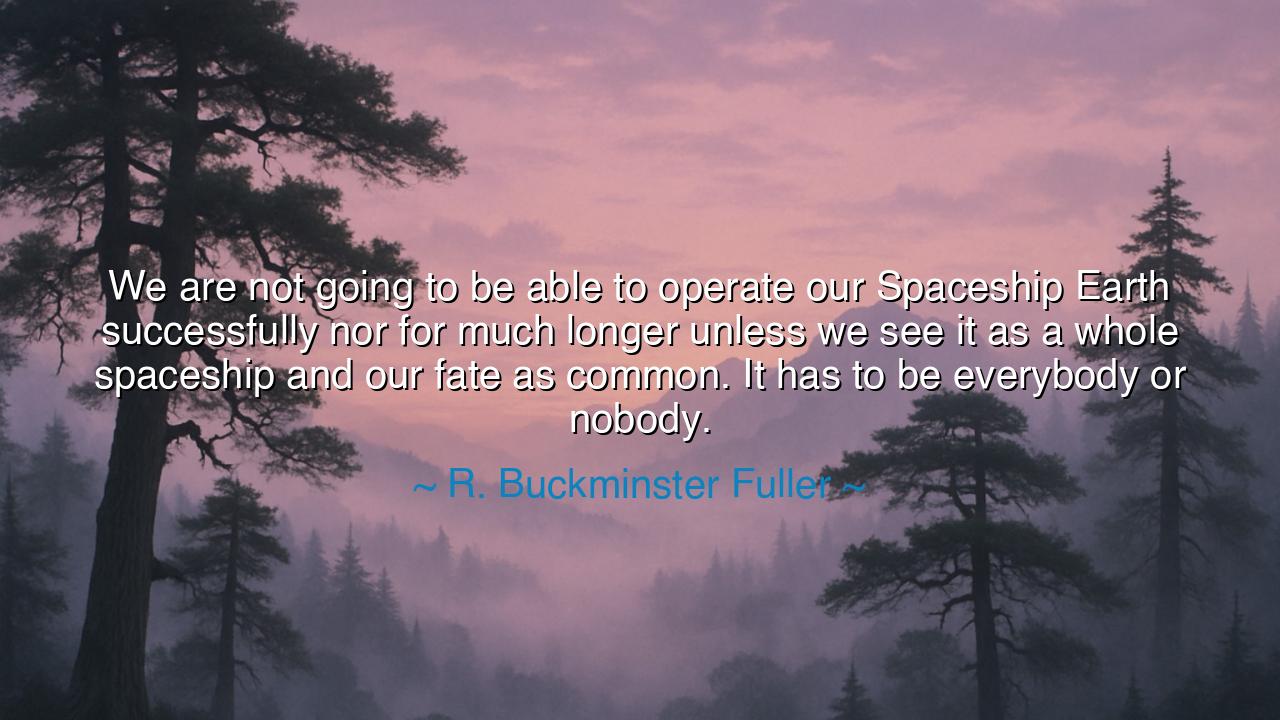
We are not going to be able to operate our Spaceship Earth
We are not going to be able to operate our Spaceship Earth successfully nor for much longer unless we see it as a whole spaceship and our fate as common. It has to be everybody or nobody.






In the vast universe, where countless stars shine and planets spin in their ancient dance, there exists a single, fragile sphere that holds the entirety of our lives. R. Buckminster Fuller, a man of great vision and insight, once spoke words that echo with the deep wisdom of the ancients: "We are not going to be able to operate our Spaceship Earth successfully nor for much longer unless we see it as a whole spaceship and our fate as common. It has to be everybody or nobody." These words, though spoken in modern times, carry with them the ancient truth that we are all interconnected, that the survival of one is tied to the survival of all. Earth is not a collection of isolated lands and peoples, but a single, fragile vessel hurtling through the cosmos, dependent on the actions of all who dwell upon it.
For centuries, the great civilizations of the Earth believed in the power of their individuality. The Greeks and Romans, with their mighty empires, saw themselves as distinct, separate entities, each pursuing their own glory. But even they, in their height, could not escape the realization that the world was an interconnected whole. The fall of these mighty civilizations was not just a failure of individual rulers or leaders, but a failure to understand the deep interdependence of all human endeavors. The very structure of the Earth, like the ship that carries us across the seas, relies on the careful balance of all its parts working together. The failure of one part can bring the whole down. Fuller’s words remind us that we are not isolated, but part of a larger whole, and the future of the Earth depends upon this collective recognition.
In the same way, consider the ancient explorers who set sail across unknown seas, driven by the desire to discover new lands and new worlds. They did not venture alone. Their ships carried not just individuals, but whole crews, each playing their part in the journey. The success of their voyages was not the triumph of a single individual, but the triumph of the collective effort. It is the same with our Spaceship Earth—the success of our future depends not on the actions of a few, but on the cooperation of all. Fuller’s wisdom is a call to unite in the face of the challenges that lie ahead, to understand that our survival depends on the shared efforts of every human being. If we do not act as a whole, we will fail as individuals.
Even in the modern age, as technology and science have brought us closer together, the challenges we face are no less great. From climate change to global conflict, we face threats that cannot be solved by individual nations or groups acting in isolation. Our very survival as a species is now tied to the health of the Earth, the well-being of its ecosystems, and the stability of its societies. The concept of Spaceship Earth is more relevant today than ever before. Our fate is shared, and if we fail to see ourselves as a collective, working toward a common goal, we risk unraveling the very fabric of our existence. Fuller’s words are a reminder that the problems of today cannot be solved by narrow, individualistic thinking, but by a broad, global vision that recognizes the interdependence of all life.
Think of the great philosophers who, throughout history, have taught the importance of unity and shared responsibility. Plato spoke of the ideal city, where each individual contributed to the greater good, understanding that the well-being of the city depended on the harmony of all its parts. Similarly, Confucius taught that the well-being of society was rooted in the understanding that each person’s actions impacted the whole. Fuller’s vision echoes these ancient teachings, urging us to see that our destiny as a species is not individual, but collective. Our future depends on our ability to work together, to understand that the survival of the planet and all its inhabitants is tied to the actions of each and every one of us.
The lesson of Fuller’s words is one of unity, of recognizing that the survival of humanity is not an isolated endeavor, but a shared responsibility. The Earth, like a great spaceship, is hurtling through the vast cosmos, and it is up to all of us—every nation, every individual—to ensure that it remains healthy and sustained. The time for division and competition has passed; the future of our world depends on our ability to collaborate, to recognize that we are all in this together. Everyone must take part, for if any one part of the system falters, the whole will suffer.
O children of the future, understand this: you are not separate from one another, nor from the world that sustains you. The success of the Spaceship Earth is tied to your willingness to work together, to care for the Earth and for each other. Let this vision guide your actions, and remember that the fate of all is shared by all. Your actions, no matter how small, contribute to the greater good. Just as the ancient explorers sailed into the unknown as one, so must we face the challenges of the future with unity and purpose. The time to act is now, for if we do not rise together, we will fall together. Let the wisdom of the past guide you, and the hope of the future drive you to build a world where everyone’s well-being is cared for, and the Earth remains a thriving, vibrant place for all who dwell upon it.






AAdministratorAdministrator
Welcome, honored guests. Please leave a comment, we will respond soon